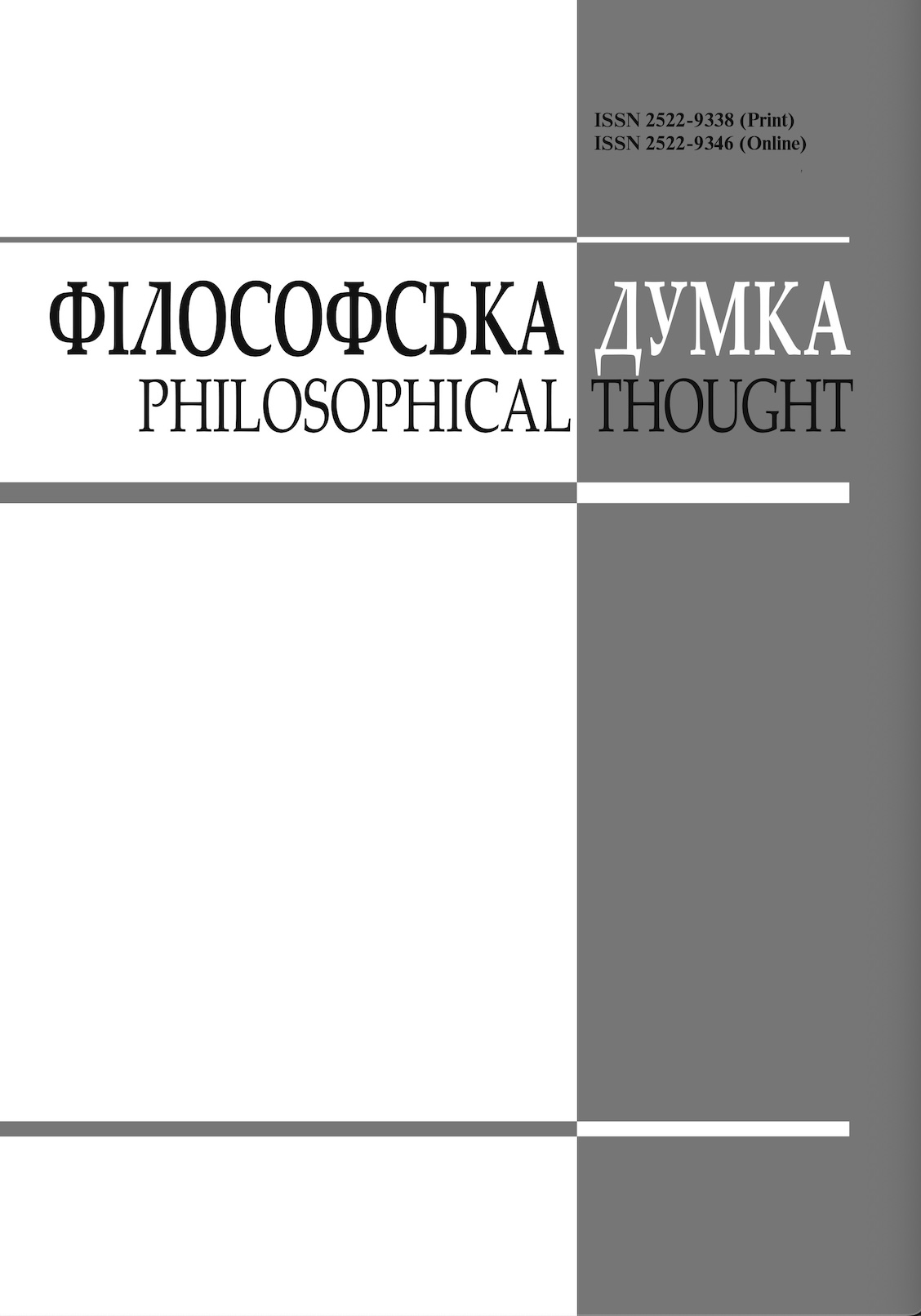FROM A JUST WAR TO A JUST PEACE. MORAL PRINCIPLES AND LIMITS OF COMPROMISES IN WARTIMES
RETURN TO THE TOPIC: Philosophical Discourses of War
DOI:
https://doi.org/10.15407/fd2024.04.087Keywords:
Russo-Ukrainian war, theory of just war, just peace, political compromise, moral judgement, compromises in wartimeAbstract
The article’s reasoning is based on the definition of the nature of the war in Ukraine, which, following the Russian aggression on February 24, 2022, escalated into a full-scale conflict: this war has gradually acquired features of the total wars of the 20th century and transformed into a war of attrition, which could last for a considerable period of time. If such a war does not end with the capitulation of one of the parties, the most likely outcome would be a peace agreement involving third parties, which would take the form of a compromise and involve a renunciation by the participating parties of complete victory in the war.
Given the just nature of Ukraine's war against Russian aggression, the author raises the question of whether a peace can be considered just without a complete victory over the aggressor and without the full restoration of justice disrupted by the aggression. Drawing on the classical work of M. Walzer, the author concludes that renouncing complete victory and halting hostilities at a point when the conflict can be resolved through political means fully aligns with the concept of a just war as a limited war. To establish the moral principles and possible limits of compromises in wartime, the author turns to A. Margalit’s concept, which, in his view, continues Walzer’s reasoning by outlining the possibility of compromises for the sake of peace.
Drawing on contemporary research on political compromises, the author analyzes possible configurations of compromises in wartimes, their differences from political compromises in peacetime, and other potential outcomes of a war of attrition, including scenarios such as the capitulation of one of the parties or a modus vivendi. The article develops on the ideas of M. Walzer and A. Margalit, emphasizing that limiting the war and reaching a compromise for peace make necessary to clarify the requirements of justice. This, in turn, necessitates that the party engaged in a just war be guided by the ethics of responsibility when determining war aims, while also adhering to the fundamental distinction between good and evil in order to avoid "rotten" compromises.
This research was funded by the Swiss National Science Foundation, grant “Compromises in Wartime”; the author is also grateful to UNIL Professor Sandrine Baume for supporting his research in the field of political compromises
References
Aron, R. (1953). En quête d'une philosophie de la politique étrangère. Revue française de science politique, 3(1), 69-91. https://doi.org/10.3406/rfsp.1953.452691
Aron, R. (2006). The Opium of the Intellectuals [In Ukrainian]. (Translated from French by G. Filipchuk). Kyiv: Univers.
Audoin-Rouzeau, S., Bujon, A. (2023). Une nouvelle grande illusion? Esprit, Mars(3), 35-42. https://doi.org/10.3917/espri.2303.0035
Baume, S., Papadopoulos, Y. (2022). Against compromise in democracy? A plea for a fine-grained assessment. Constellations, 1-17. https://doi.org/10.1111/1467-8675.12595
https://doi.org/10.1111/1467-8675.12595
Brunstetter, D., Holeindre, J.-V. (2012). La guerre juste au prisme de la théorie politique. Raisons politiques, 1(45), 5-18.
https://doi.org/10.3917/rai.045.0005
https://doi.org/10.3917/rai.045.0005
Canto-Sperber, M. (2010). L'idée de la guerre juste. Paris: PUF.
https://doi.org/10.3917/puf.canto.2010.01
Gillot-Assayag, L. (2024). Raymond Aron and the 'Sense of Compromise' in Democracy. Journal of French and Francophone Philosophy, 31(1), 210-225. https://doi.org/10.5195/jffp.2023.1040
https://doi.org/10.5195/jffp.2023.1040
Margalit, A. (2010). On Compromises and Rotten Compromises. Princeton: Princeton University Press.
https://doi.org/10.1515/9781400831210
Nachi, M. (2006). Esquisse d'une théorie du compromis. In: M. Nachi, M. de Nanteuil (dir.), Éloge du compromis. Pour une nouvelle pratique démocratique (pp. 145-174). Louvain-la-Neuve: Academia-Bruylant.
Nachi, M. (2022). Compromis. In: ANTHROPEN. Le dictionnaire francophone d'anthropologie ancré dans le contemporain (pp. 1-8). Presses universitaire de Laval. https://doi.org/10.47854/anthropen.v1i1.51533
https://doi.org/10.47854/anthropen.v1i1.51533
Spang, F. (2023). Compromise in Political Theory. Political Studies Review, 21(3), 594-607. https://doi.org/10.1177/14789299221131268
Van Parijs, Ph. (2011). Qu'est-ce qu'un bon compromis? In: M. Nashi (dir.), Les figures du compromis dans les sociétés islamiques. Perspectives historiques et socio-anthropologiques. Paris: Karthala.
https://doi.org/10.3917/kart.nachi.2011.01.0085
Walzer, M. (2006). Just and Unjust Wars. A Moral Argument with Historical Illustrations. 4th edition. New York: Basic Books.
https://doi.org/10.1111/j.1748-0922.1978.tb00022.x
Yermolenko, A. (moder.). (2023). Ukraine and the world after February 24, 2022: Round Table Discussion of "Filosofska Dumka". [In Ukrainian]. Filosofska Dumka, (2), 7-72.
https://doi.org/10.15407/fd2022.04.007
Yosypenko, S. (2022). The long twentieth century? [In Ukrainian]. Filosofska Dumka, 3, 83-97. https://doi.org/10.15407/fd2022.03.083
Downloads
-
PDF (Українська)
Downloads: 256
Published
How to Cite
Issue
Section
License
Authors who publish with this journal agree to the following terms:
- Authors retain copyright and grant the journal right of first publication.
- Authors are able to enter into separate, additional contractual arrangements for the non-exclusive distribution of the journal's published version of the work (e.g., post it to an institutional repository or publish it in a book), with an acknowledgement of its initial publication in this journal.
- Authors are permitted and encouraged to post their work online (e.g., in institutional repositories or on their website) prior to and during the submission process, as it can lead to productive exchanges, as well as earlier and greater citation of published work (See The Effect of Open Access).


